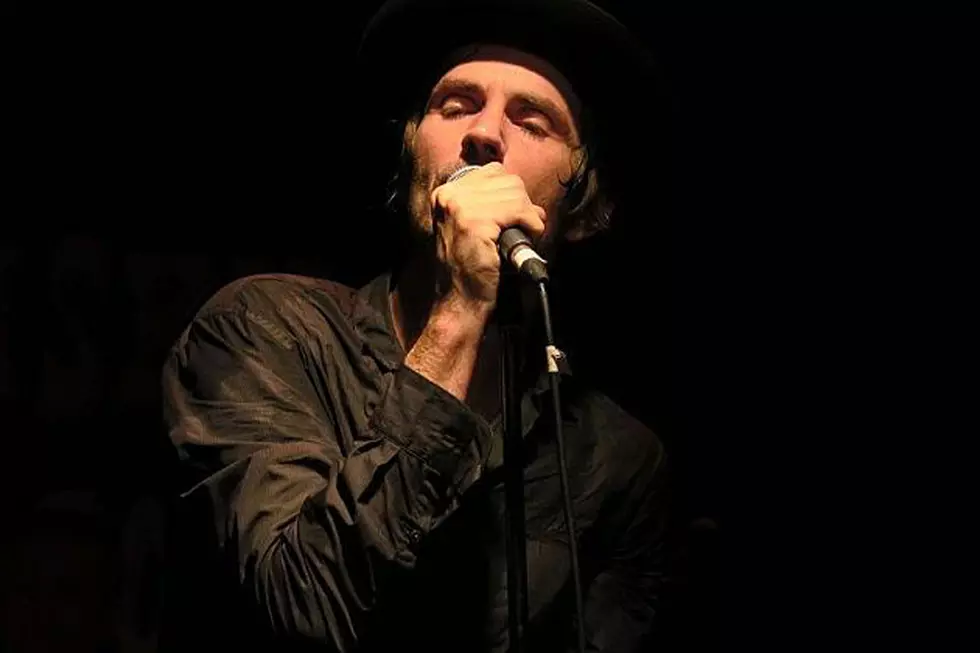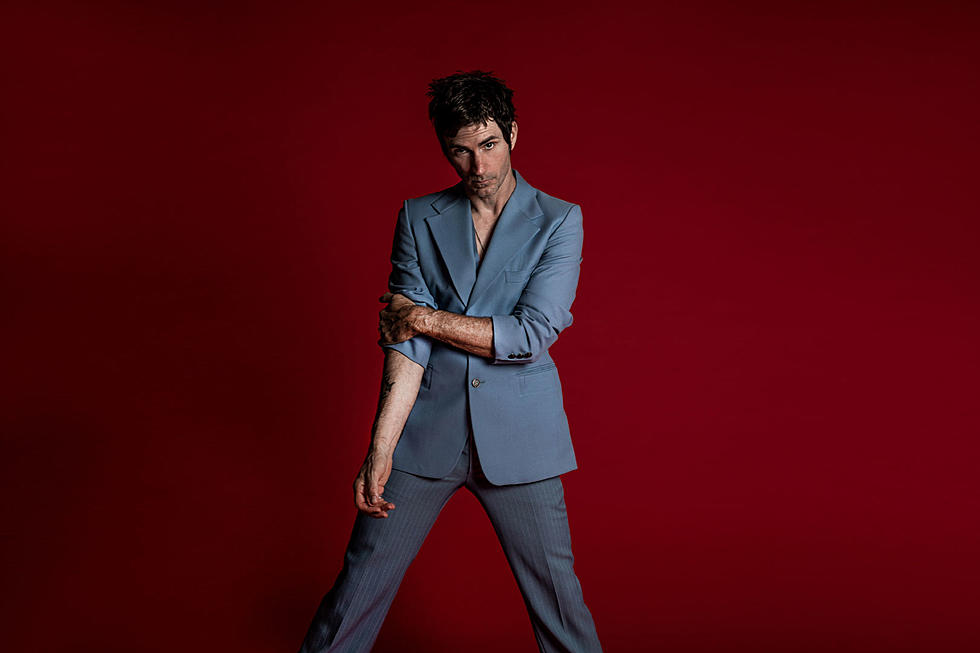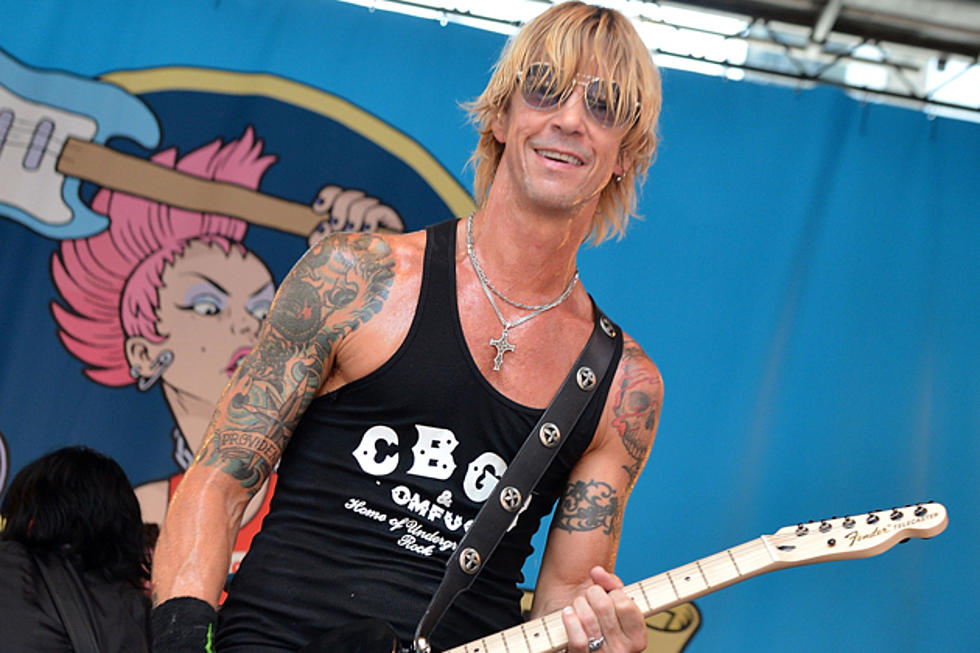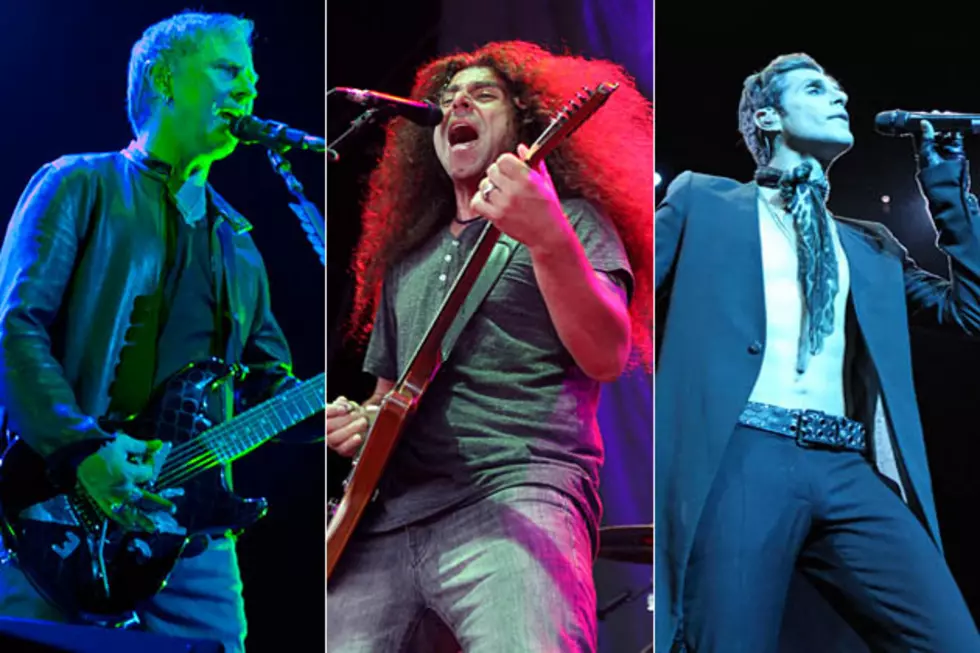
Walking Papers’ Jeff Angell Talks Validation From Famous Bandmates, a More ‘Blistering’ ‘WP2′ Album
Walking Papers arrived on the scene in 2012, mostly known for their famous rhythm section (Duff McKagan and former Screaming Trees/Mad Season drummer Barrett Martin), but it wasn't long before fans started to appreciate the talents of the lesser known singer-guitarist Jeff Angell and keyboardist Benjamin Anderson, who came to the project from their band The Missionary Position. The group's self-titled debut earned raves for its bluesy rock style and the band turned heads on the concert stage with their stellar live show. Fast forward to 2018 and Walking Papers are back with the aptly titled WP2, a disc that raises the bar for the foursome with its expressive lyrical content and even more blistering sounds.
Ahead of the album's release today (Jan. 19), we had a chance to speak with Jeff Angell about the new disc, with the vocalist/guitarist offering some insight into the creation of WP2, how a comic collaboration derived from one of their songs and what it's been like to play with two musicians who were part of his musical upbringing.
Did you have an idea creatively of what you wanted to do going into this record or did it develop as you were putting the music together?
Oh that would make us sound like guys who were able to make plans and keep 'em. (laughs). No, it was not too premeditated. We just kind of go for it and keep our eyes and ears open for good lyrics and cool places to land ‘em.
Speaking of cool lyrics, one of the things I love in listening to music is when there is more description and story involved. You guys really paint a picture with your lyrics and make it feel like character sketches. On your songwriting style, what inspired that and how do you define the characteristics of what you want in a song?
I’m grateful to hear that. I feel that a good lyric validates the music and vice versa. I think a song can say in three verses what it takes a novel to say in 300 pages if you get it right and a lot of that is because you’re leaving it up to the listener’s imagination.
I used to think it was unfortunate, but now I think it was probably fortunate that I grew up with a lot of shady characters in my life. What do they say – comedy is a little tragedy with time? So I can see that, and I love a good character and I love a little chaos. I figure it’s all good as long as the songs are a good place to keep these people. If we keep ‘em in the song and off the streets, we’re in a better place (laughs).
Can you take me into the process a little bit working with Barrett, Benjamin and Duff and bouncing these song ideas off each other? Are you ever surprised by what comes up?
Well the lyrics are kind of my thing. With being the singer, I feel like you really have to believe ‘em and if I was singing someone else’s words I don’t think I could [relate as well]. That’s why I kind of do my thing. That’s why I got into this is to write my own stories even more than music. And with the band, sometimes I’ll have a fully developed idea and other times, Barrett and Duff will kind of solve the other things that Ben and I were up to. They kind of wanted to champion that and that’s how we ended up playing with them. But it’s hard to not hear them screwing around and going, ‘Man, that should be a song right there.’
So this record, more than the first record, was songs that I wrote at home and did a little jamming with Barrett to try them out and Barrett kind of produced some of those ideas and made me kind of see some beauty in a few of the songs that I maybe didn’t fully appreciate. But on this record, to keep everyone involved, I was running around secretly, like if they were jamming at a sound check, I’d record them on my phone and stuff like that and then start thinking, which one of these can I fit a vocal thing to. When I could flesh it out and come up with some changes and get back together with them in a room, I was able to sell them their own idea right back to them. This was the first time we did that, so I think it’s helped the band evolve a little bit.
Seeing you live in the past, I felt you kind of take it up a level from even what we hear on record. Going into this album, is the live experience something you factor into your writing?
I don’t think about the live show at all when writing the songs, but we do when we pick what songs we’re gonna play live. We definitely, depending on if we’re playing a headlining or a supporting set and we’ve got six songs to win them over, so we groom the set for that. But I will say that playing that first album live, I got an illustrated view of what this band could do, so when we started to write the new songs, I saw that we had the potential to play some stuff that was a little more blistering, whereas maybe the first record was a little more reserved. So I think we did a good job of capturing that live spirit on this record, but at the same time still having some bells and whistles in there. We try to make it sound like a production.
The guitar playing on “Hard to Look Away” is awesome. Can you discuss that track, how it came together and the also about breaking out the guitar more so in that song.
Well, I’m all for giving credit where credit is due and that would be the only Barrett Martin riff.
Oh man.
Yeah, so he would throw some ideas at me and he would have some changes to my songs and stuff like that, but he brought in the very first riff that repeats a couple of times and I’m like, ‘Hey, that one over there is shiny. It’s got some good potential to it.’ So I grabbed the riff and twisted it around a little bit and added some changes to it and it was kind of an instant song. It didn’t take long to make it happen. But the riff has kind of a Jimi Hendrix [feel], a more modern and brutal take on that. I thought it was great instantly and he deserves the credit for that one.
From a lyric standpoint, I love the idea of “Death on the Lips.” What a visual and turn of phrase …
I appreciate that. That’s one of my faves too. It’s kind of funny, they tell us you’ve gotta type all the lyrics out and send ‘em in to put on the record, and I kind of saw the common thread on this record is redemption or temptation. There’s some kind of thing going on there or some kind of proverb in the Bible that says, “Like a dog returns to its vomit, a fool returns to its folly.” So being on tour and having a girlfriend and being a sober guy, you’re out there on the road and sometimes you’re stuck in Berlin, a 24-hour city, for four nights in a row and I could just hear all of my bad choices in my life telling me, “C’mon, you could do some more of this. No one would even know.” And I think that I found that instead of engaging in it, which I do with a lot of my songs, I just kind of lived vicariously through the song and psychoanalyzed myself through the song.
I definitely caused myself a lot of harm in my youth, but I think now I have the wisdom to know that I know where that story goes. And I like to look at it on the record and I like to think that there’s a lot where the past isn’t quite done with you. Those challenges I think define a person’s character, and so I’m really proud of this record and the moments that inspired the record.
I definitely want to hit on “Red and White,” which is my favorite track on the album. Let’s discuss where that one came from.
I’m kind of a stir crazy guy so one thing I love about going on the road, I’m perfect for the road because once you get in a van, what can you do? I can’t not do nothing. I can’t sit there and watch TV, so I just start writing lyrics or read books or something like that. I make pretty productive use of all the idle time. And so the “Red and White,” you just see the cars coming and going on the freeway in front of you and these different pieces just kind of fell together.
Ben had the chords for the chorus on the piano. I’d always hear him warming up on this one little progression and it was like, “You’ve gotta let me have my way with that thing.” So we got together like Lieber and Stoller or something, got together in my basement and hammered out the song. We felt like pro songwriters, coming out four hours later with a song, lyrics and everything.
I’m pretty proud of that song too. Lyrically and the musical progressions that are going on there, I just think that’s just about as good as songs get. If you’re not in the mood for it and you want something to put some spring in your step, maybe that ain’t the kind of song for ya, but I kind of like songs with a little bit of darkness in it and I just really can’t imagine that song being any better, so I’m really blessed to have been part of it and for Ben to inspire me with the progression.
I’ve seen where you’re doing a comic book off of “This Is How It Ends” with Csaba Master and Matt Hayward. Can you share how this came about?
Matt Hayward’s a pretty friendly guy and I met him playing a show in Ireland and funny enough I met Csaba in Hungary and he did these drawings of us and gave them to us. So I knew the two guys separately, but I didn’t know either all that well. So Matt had asked me if he could use the lyrics for a song I had in this other band, The Missionary Position. So he said he was inspired to write a story about that, which he did. It was called “Where the Wild Winds Blow,” and it got published.
I thought it was really cool how the Nebraska record by Bruce Springsteen has one of the songs – “Highway Patrolman” – got turned into a movie. So I always loved the idea that maybe someday, one of my songs would inspire someone to take it further. And so they were doing a comic book and I found out that they knew each other, and I’m like, “Oh wow, what a coincidence. If you ever wanted to take a song and turn it into a comic book, have at it. I think it would be cool.” And they were into it and basically took it from there. I didn’t have anything else to do with it except for getting excited every time they’d send me a new page. It’s a total blessing to get to work with people like that who have such drive and ambition.
That’s awesome. I think it’s great to see music translated beyond just hearing and considering how will it be presented visually, through videos, comic books, onstage. Is that a big consideration for you?
Oh I think that’s awesome. I mean I have a movie that goes on in my head and that’s why I write these songs. It’s like I have a whole other world going on in my own imagination. But visually, I don’t know that anyone’s created anything yet that capture it as vivid as a person’s imagination … at least mine. I don’t think that I’m exception, but I do think a lot of people probably have super vivid dreams and imagination and that’s what’s so beautiful about songs is that it just sends you on that trip. It’s a magical thing.
I wanted to ask about Duff McKagan as well. I see he’s not able to play your upcoming release show and obviously Guns N’ Roses is a huge thing. How cool is it to have a guy in the biggest band in the world but also knowing he wants to be part of what you’re doing musically as well?
It’s pretty cool. It’s validating is what it is. I grew up and those guys were a huge influence on me when I was a kid. I was 12 or 13 when [Appetite for Destruction] came out and that was the record for me. I was like, “I’m not pretty enough for what MTV is selling me and I don’t have the weird thrash metal macho ink, so I’m not that guy.” So when their band came out, I was kind of like that’s me. I’m kind of in the middle – somewhere between a punk sleazy guy and a normal dude who likes his rock and roll.
To me, Appetite for Destruction and N.W.A.’s Straight Outta Compton really captures Los Angeles in 1987. Maybe a little Jane’s Addiction too, but those guys were heroes of mine and I didn’t seek them out, they kind of sought me out. And living in Seattle and seeing the grunge thing. You know, I’d never met Barrett Martin but with Mad Season and Screaming Trees, basically I have two guys from two of the most musically influential periods to me actually want to make music and support my songs and stuff like that, that’s my Grammy I guess. That’s my validation and reward and it’s kind of humbling and overwhelming at the same time, but it’s also nice to have people that you respect and admire believe in what you’re doing.
Plus, I get all these great stories about Guns N’ Roses. You know I don’t really care. I give two shits about what happens to someone after they get famous, but I always want to know that struggle … the struggle in getting the songs together and it’s really, really interesting in how they put together Appetite for Destruction and I don’t think it’s at all like people think. I mean those guys knew those songs and they had half of the next album already written. They really struggled and I really love that. It was really exciting, but holy shit, this ain’t a Guns N’ Roses redo (laughs)
(laughs) Well moving on from that, I was going to ask about the show you have coming up, as Walking Papers’ live lineup for the release show has an upright bass player, a trumpet and sax player as well as an additional guitarist. Is this what you’re looking at for touring or is this just the one show as Duff’s not able to join in?
We’re liking the idea of doing anything. We’ve played some shows as a three-piece as well, with me on guitar and Ben on keys and in two of the other bands I’m in – Staticland and the Missionary Position – Ben played all the bass on his keyboards, sort of like The Doors. So this is really the only band I’ve been in that had a bass player for a long time.
But also, I like playing rock and I grew up on that, but to be honest I probably listen [more] to Leonard Cohen and Tom Waits and Nick Cave and Bob Dylan. I listen to music that’s more like that than I do hard rock. But at the same time being a guitar player I grew up on AC/DC and Black Sabbath and stuff like that, so I’m kind of a weird hodge podge. But having a horn section and Ben playing piano, you can hear chord progressions that for you as a guitar player sound boring, but you get these guys to play the same progression with a different instrumentation and it elevates it. It makes it exciting to me again and now I don’t feel like I’m kind of recycling the same kind of thing. There are different inversions of different chords that you just can’t get with the guitar. It doesn’t really lend itself to making it happen.
What’s on the horizon for the band as we start 2018?
There’s some opportunities that are starting to drop in for the touring and we’ll take that as it comes. I don’t think Duff’s available. He’s got a cash machine over there that he’s got to tend to (laughs). So the rest of us are going to do what we can do and whatever comes to us. We don’t think too much about it. I’ve had such a good run of music my entire life and I’m grateful for it and everything that comes I’m happy to get in on it.
The band's second album, 'WP2,' is in stores today and you can order it through PledgeMusic; one of the Pledge tiers also gives you the chance to pick up the 'This Is How It Ends' comic. At present, the band has a Jan. 27 show at the Crocodile in Seattle, and you can follow the group on Facebook to see when more dates are added.
More From Loudwire









